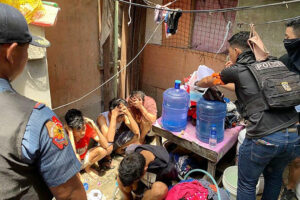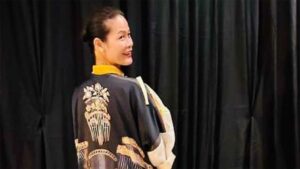Analysts: Duterte likely to be tried for drug war

By John Victor D. Ordoñez and Kyle Aristophere T. Atienza, Reporters
THE INTERNATIONAL Criminal Court (ICC) would probably prosecute President Rodrigo R. Duterte and his agents as soon as it resumes its investigation of the government’s deadly war on drugs, according to political analysts.
“Duterte and former national police chief Ronald M. dela Rosa will surely be charged,” Antonio Gabriel M. La Viña, a human rights lawyer and former dean of the Ateneo de Manila University’s School of Government, said in a Facebook Messenger chat.
“For now, based on what incoming National Security Adviser Clarita R. Carlos said, the next administration seems open to cooperating with the ICC. We need to be vigilant,” he added.
Ms. Carlos earlier said she was open to the ICC’s investigation of extralegal killings in Mr. Duterte’s anti-illegal drug campaign.
“We defer to the new administration,” Martin M. Andanar, Mr. Duterte’s spokesman said in a Viber message. He earlier said the ICC, which tries people charged with genocide, crimes against humanity, war crimes, and aggression should “let these efforts of the Philippine government run their course.”
ICC Prosecutor Karim Ahmed Khan at the weekend asked the international tribunal’s pre-trial chamber in a 53-page filing to reopen the probe months after it was halted upon the Philippine government’s request.
He said the chamber should issue an order on an “expedited basis.” It should “receive any further observations it considers appropriate from victims and the government of the Philippines,” he added.
“If the ICC is consistent in its pronouncements, it will probably have less compunction in investigating Duterte and his allies now,” Hansley A. Juliano, a former political science professor a studying at Nagoya University’s Graduate School of International Development in Japan, said in a Facebook Messenger chat.
“There’s no shortage of people in civil society and the Philippine Catholic Church who are invested in the proceedings so they will keep on pushing it.”
Filipino lawyers have been calling on the ICC to resume its probe of the anti-drug campaign, saying the Department of Justice (DoJ) was only looking at 52 deaths out of the tens of thousands killed.
Justice Secretary Menardo I. Guevarra on Sunday said the DoJ should have been given more time to produce results first, adding that Mr. Khan’s move to proceed with the investigation was premature.
Philippine prosecutors have filed charges in court against law enforcers in four cases and planned to probe 250 more of what could have been wrongful deaths in Mr. Duterte’s war on drugs, Mr. Guevarra told the United Nations Human Rights Council in February.
“This would mean the Duterte administration has failed to satisfy the ICC’s expectations on it acting on the necessary investigation on the war on drugs,” Marlon M. Villarin, who teaches political science at the University of Santo Tomas, said in a Viber message.
“This could be one of the litmus tests on the sincerity of the incoming administration of President-elect Ferdinand R. Marcos, Jr., with his campaign promise of making the government more transparent and accountable for the war on drugs not just domestically but internationally,” he added.
Mr. Marcos has named Mr. Guevarra solicitor general, the government’s chief lawyer.
Incoming Justice Secretary Jesus Crispin C. Remulla has said he would look into the DoJ’s initial review of the anti-illegal drug campaign.
The International Coalition for Human Rights said in March it would sanction the architects of Mr. Duterte’s war on drugs.
This was a follow-up on a report conducted last year by Investigate PH, an independent human rights group that alleged patterns of systemic human rights violations including crimes against humanity by the government.
In 2016, Mr. Dela Rosa as national police chief signed a circular that allowed police officers to visit the homes of suspected illegal drug personalities to persuade them to stop their drug-related activities.
Mr. Guevarra earlier said Mr. Duterte’s war on drugs was largely successful despite “excesses” committed by rogue cops.
He said the DoJ has been addressing these excesses through its drug war committee that probes reports of abuse or unnecessary force committed by cops during the operations.
An inter-agency committee formed 15 teams last year that probed extralegal killings and human rights violations.
‘TOO BUSY’The Philippine Human Rights Commission said the Duterte government had encouraged a culture of impunity by hindering independent inquiries and by failing to prosecute erring cops involved in the government’s anti-drug campaign.
“Since the center of gravity is moving away from him to Marcos Jr., we are still waiting for the new order to become more apparent — and with it, to what extent will the Marcos Jr. administration be well disposed to the ICC,” Mr. Juliano said.
“We do not expect it to be cordial in any way, especially since the presence of incoming Vice-President Sarah Duterte-Carpio is presumably for that kind of continuity.“
But Western countries might not pressure Mr. Marcos enough to cooperate with the ICC probe because they are too busy dealing with new geopolitical conflicts including Russia’s invasion of Ukraine, Robin Michael U. Garcia, a political economy professor at the University of Asia and the Pacific, said in a Messenger chat.
Human rights will always be high on the agenda of the European Union (EU) “but it may be more inward-looking now because of its issues with Russia,” he said.
The EU, which has been monitoring the Philippines’ human rights situation under outgoing President Rodrigo R. Duterte, released a five-year roadmap in 2020 to send a strong signal about its commitment to human rights.
“There’s a possibility that the EU might lessen the pressure since it has been dealing with pressing problems and might want to prioritize forging closer diplomatic ties with the new government,” Dennis A. Coronacion, who heads UST’s Political Science Department, said in a Viber message.
Mr. Garcia said the US could not afford to lose its alliance with the Philippines as it counters China’s influence in the Indo-Pacific region.
The Duterte government had said it would not cooperate with the ICC in its probe of the drug war given the country’s functioning justice system.
It has also argued that the ICC could not pursue the probe since the Philippines in 2018 withdrew from a statute that created the United Nations-backed tribunal — an argument that the Supreme Court rejected in a 2021 ruling. Withdrawing from the Rome Statute does not discharge a state party from the obligations it has incurred as a member, the court said.
“In any case, the country’s compliance with calls from the international community will also depend on the President-elect’s relationship with the Dutertes and his top aides,” Mr. Garcia said. “It might not be politically wise to create political enemies at the moment.”
Arjan P. Aguirre, who teaches political science at the Ateneo, said the Western community is aware now that Mr. Duterte had managed without pursuing closer ties with them.
“Marcos will follow that route,” he said in a Messenger chat.
He added that the incoming Philippine leader would likely ignore Western pressure to allow the drug probe because he is popular and the status quo is “more favorable to him.”
“The opposition is weak, Marcos is popular and yes, the status quo promises more stability to the administration,” he said. “They will certainly stick to the existing conditions.”




